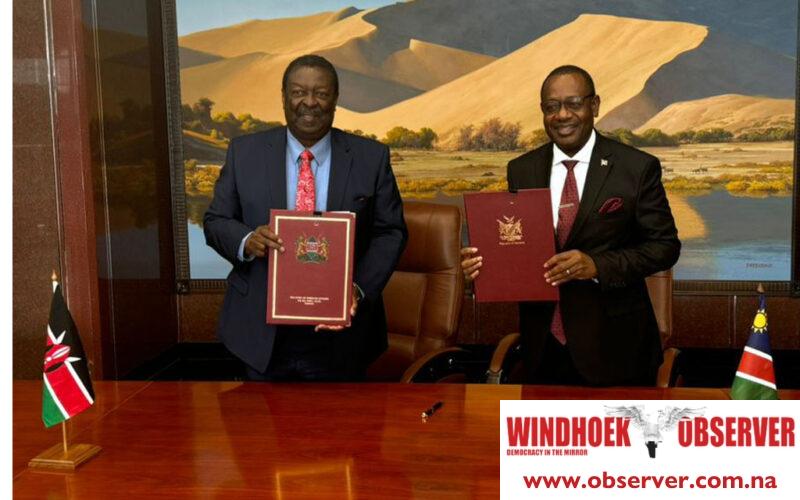Niël Terblanché
Namibia and Kenya are both seeking greater leverage in regional and continental opportunities for improved economic growth, trade, and regional integration.
The Namibia–Kenya political and diplomatic consultations held in Windhoek earlier this week resulted in a joint communiqué in which the countries stressed their commitment to deepening their bilateral relations, with a strong emphasis on economic cooperation and increased political engagement.
The consultations related to a broad array of mutual interests were hosted by Namibia’s Minister of International Relations and Cooperation, Dr Peya Mushelenga, and Kenya’s prime cabinet secretary and cabinet secretary for foreign and diaspora affairs, Musalia Mudavadi, respectively.
The talks took place at a critical time because both countries were looking to take advantage of economic growth opportunities in the region and across the continent, according to the joint communiqué.
They specifically sought to use the Tripartite Free Trade Agreement (TFTA) and the African Continental Free Trade Area (AfCFTA) to hasten the region’s economic integration.
Namibia and Kenya are signatories to these agreements, and the ministers jointly called for mobilising public and private sector stakeholders to take full advantage of the pro-business policies in place.
The leaders also recognised the potential for enhancing trade relations by focusing on key sectors such as agriculture, livestock, and the blue economy.
Namibia and Kenya have enjoyed a strong partnership since establishing formal diplomatic ties in 1964, and both nations have committed to further strengthening these relations.
In addition to exploring new business opportunities, Mushelenga expressed Namibia’s intent to open a diplomatic mission in Nairobi in the near future.
According to the joint communiqué, this move is expected to facilitate smoother trade exchanges and enhance cooperation in sectors such as health, education, and aviation.
Beyond economic cooperation, the consultations addressed several pressing global issues.
The ministers called for the full implementation of United Nations resolutions concerning the Western Sahara and the Palestinian question, reaffirming their stance on international law and human rights.
They reiterated their call for the reform of the United Nations Security Council, advocating for a more democratic body that reflects the geopolitical realities of the 21st century and aligns with Africa’s common position as outlined in the Ezulwini Consensus.
The two countries are set to host key international events in the coming months.
Namibia will co-facilitate the “Summit of the Future” alongside Germany at the 79th session of the United Nations General Assembly, focussing on the “Pact for the Future,” an initiative aimed at expediting global efforts towards sustainable development.
In turn, Kenya is presenting former Prime Minister Raila Odinga as a contender for the 2025 African Union Commission Chairperson election.
Namibia expressed its support for Odinga’s candidacy.
The consultations concluded with both nations reaffirming their commitment to address global challenges such as climate change.
According to the joint communiqué, Namibia and Kenya plan to collaborate closely on climate change adaptation and resilience, particularly in mitigating the severe drought conditions that are increasingly affecting the African continent.
Both countries expressed optimism that through regular diplomatic consultations and robust partnerships, they can continue to build strong bonds of solidarity and shared prosperity.




